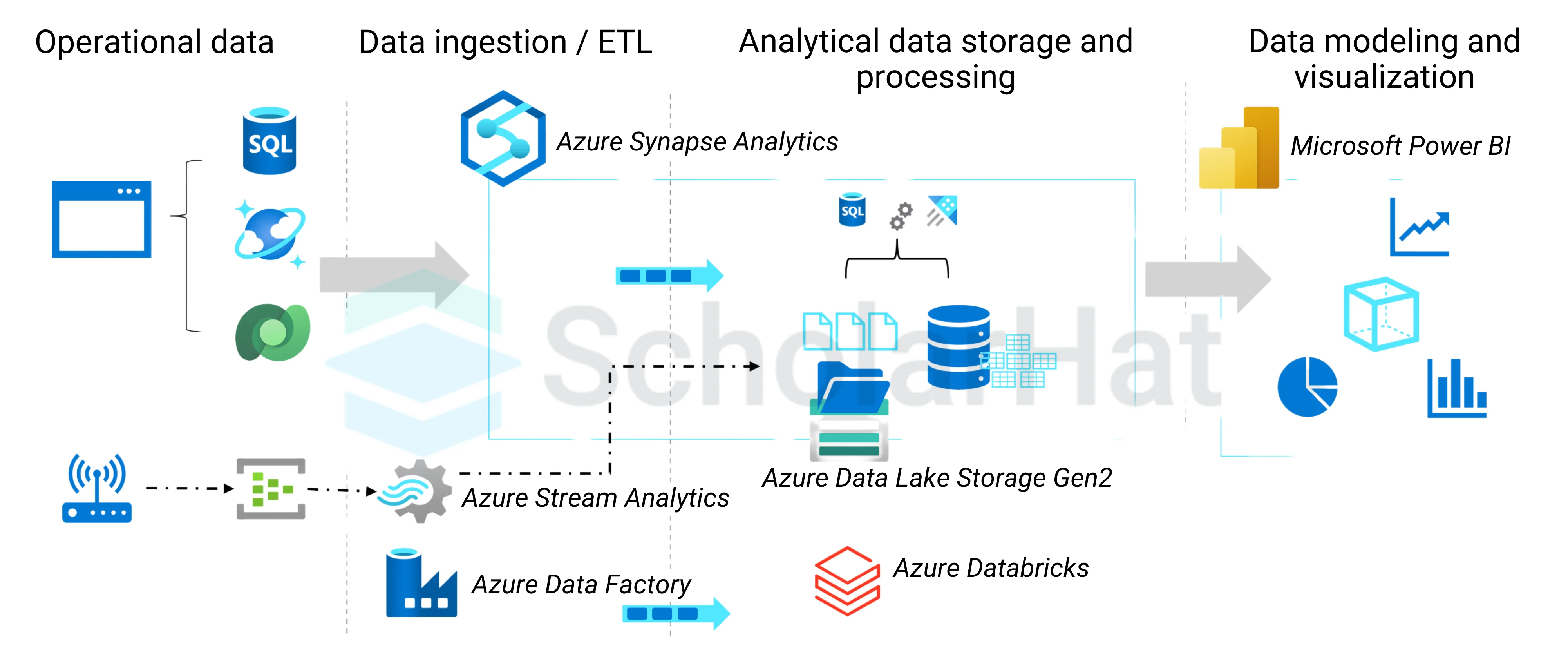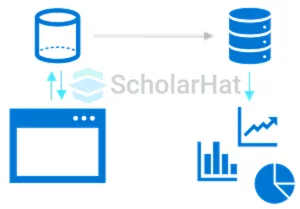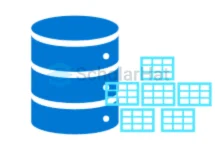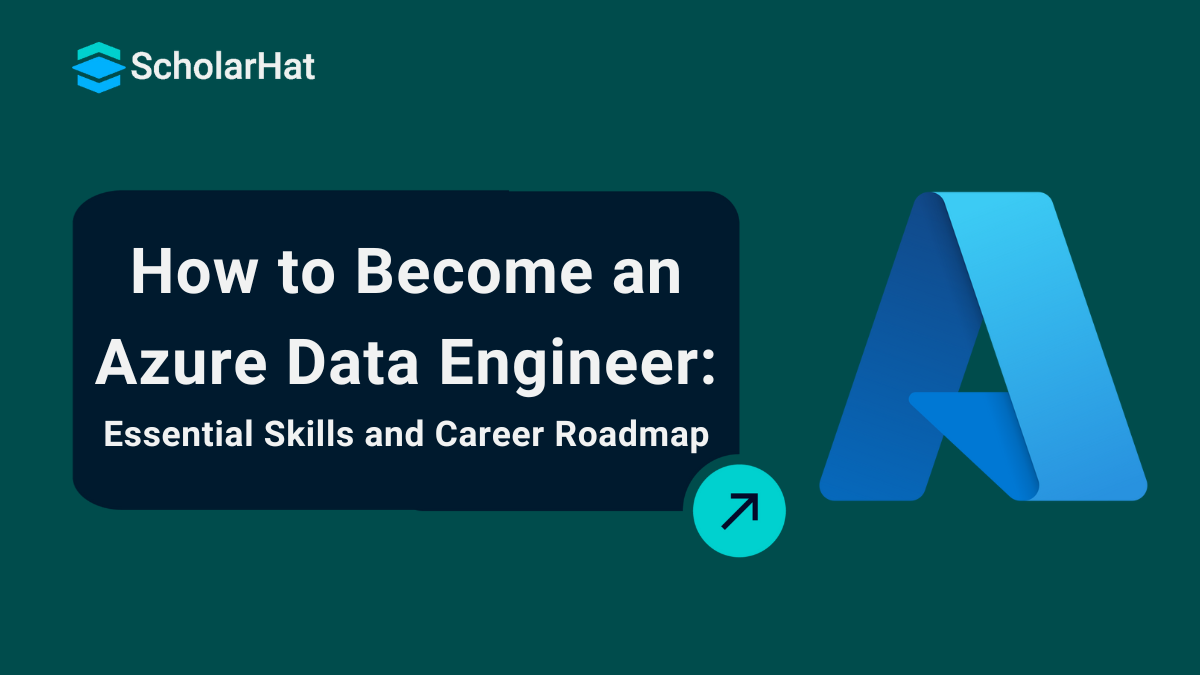18
AprAzure Data Engineer: Skills, Salary & Certification Path
Becoming an Azure Data Engineer now a days, the data-driven world is increasingly important, as businesses fully depend on data to inform decision-making and strategy. If we talk about the different platforms offered, Microsoft Azure stands out as a robust cloud computing service that includes a full set of data engineering capabilities. An Azure Data Engineer is a specialist professional who uses Azure's skills to build, deploy, and manage data solutions.
In this Azure Tutorial, we are going to know Who is Azure Data Engineer, How to Become an Azure Data Engineer, what Azure data engineer skills are, and what Azure data engineer roles and responsibilities are.
Who is the Azure Data Engineer
An Azure data engineer works especially on data pipelines and data stores that are high-performing, efficient, organized, and reliable, given a specific set of business requirements and constraints.
As an Azure data engineer, you should be proficient in using the following to create data processing solutions:
- Azure Data Factory: Azure Data Factory is a cloud-based data integration service that allows you to create data-driven workflows for arranging and automating data movement and transformation.
- Azure Synapse Analytics: Azure Synapse Analytics is an enterprise analytics service that accelerates time to insight across data warehouses and extensive data systems.
- Azure Stream Analytics: Azure Stream Analytics is a fully managed stream processing engine designed to analyze and process large volumes of streaming data with sub-millisecond latencies. It takes only a few clicks to create an end-to-end streaming data pipeline that connects to multiple sources and sinks.
- Azure Event Hubs: Azure Event Hubs is a fully managed, real-time, scalable, and trusted data ingestion service.
- Azure Data Lake Storage: Azure Data Lake Storage includes all the capabilities required to make it easy for developers, data scientists, and analysts to store data of any size, shape, and speed and do all types of processing and analytics across platforms and languages.
- Azure Databricks: Azure Databricks is a fully managed first-party service that enables Azure to have an open data lakehouse.

Roles and Responsibilities of an Azure Data Engineer
1. Design and Build Data Solutions
- You will create and manage data storage systems using Azure Data Lake, Azure SQL Database, and Azure Synapse Analytics.
- Your job is to ensure data is stored in an organized and secure way.
2. Data Processing and Transformation
- You will use Azure Data Factory and Azure Databricks to process raw data into useful formats.
- This helps companies analyze data easily and make better decisions.
3. Ensure Data Security and Compliance
- You must protect data using Azure Security tools and follow company rules.
- Your role includes managing access control, encryption, and compliance with data privacy laws.
4. Monitor and Improve Data Performance
- You will check how well data systems are working and improve them if needed.
- This includes optimizing Azure Data Engineer solutions to make them faster and more efficient.
5. Work with Data Analysts and Scientists
- You will help analysts and data scientists get the right data for their reports.
- Your work makes sure they can use Azure Data Engineer tools effectively.
6. Automate Data Pipelines
- You will create automated workflows so data moves smoothly from one place to another.
- This saves time and reduces errors in handling large amounts of data.
Being an Azure Data Engineer means smartly handling data so businesses can use it for better decision-making. Your skills in Azure Data Engineer tools will help companies process and store data efficiently.
Azure Data Engineer Skills
An Azure Data Engineer needs different skills to handle, process, and manage data using Microsoft Azure. These Azure Data Engineer skills help you build strong data solutions that businesses can use for better decision-making. If you want to grow in this field, you must learn Azure Data Engineer skills to work with big data, security, and automation.
Important Azure Data Engineer Skills
1. Knowledge of Azure Data Services
- You must understand Azure Data Factory, Azure Synapse Analytics, and Azure Data Lake.
- These services help you store, move, and process data efficiently.
2. SQL and Database Management
- You should know SQL because it helps you store and manage structured data.
- Managing databases like Azure SQL Database and AzureCosmos DBare important Azure Data Engineer skills.
3. Data Processing with Big Data Tools
- You need to work with Azure Databricks, Spark, and Hadoop to process large datasets.
- These tools help clean and transform raw data into practical formats.
4. Data Security and Compliance
- You should know how to protect data using Azure Security tools, encryption, and access controls.
- These Azure Data Engineer skills ensure that data is safe and follows legal rules.
5. Data Pipeline and ETL Development
- You must know how to create ETL (Extract, Transform, Load) pipelines using Azure Data Factory.
- This skill helps you move data between different sources automatically.
6. Coding and Scripting Knowledge
- You should know Python, SQL, and Scala because these languages help you automate data tasks.
- Writing scripts is one of theAzure Data Engineer skills for handling big data projects.
Learning Azure Data Engineer skills will help you work with large data systems, automate processes, and ensure data security. If you master these skills, you can build powerful data solutions that businesses need.
Some Important Data Engineering Concepts
Data engineers should be conversant with a few key principles. These concepts serve as the foundation for many of the tasks that data engineers must design and support.
1. Operational and analytical data

- Operational data is typically transactional data generated and saved by programs, either in a relational or non-relational database. Analytical data is information that has been optimized for analysis and reporting, typically in a data warehouse.
- A data engineer's primary responsibilities include designing, implementing, and managing solutions that integrate operational and analytical data sources, as well as extracting operational data from multiple systems, transforming it into appropriate analytical structures, and loading it into an analytical data store.
2. Streaming data

- Streaming data refers to continuous sources of data that generate data values in real-time, often in response to specified events. IoT devices and social media feeds are two common sources of streaming data.
- Data engineers frequently have to develop solutions that capture real-time streams of data and ingest them into analytical data systems, typically mixing the real-time data with other application data that is processed in batches.
3. Data pipelines

- Data pipelines are used for managing data transfers and transformations.
- Pipelines are the primary method by which data engineers create repeatable extract, transform, and load (ETL) solutions that can be activated on a schedule or in response to events.
4. Data lakes

- A data lake is a storage facility that contains enormous amounts of data in its native, unprocessed format. Data lake stores are designed to scale to huge amounts (terabytes or petabytes) of data. The data is often collected from a variety of sources and might be structured, semi-structured, or unstructured.
- The aim behind a data lake is to store everything in its original, unaltered state. This strategy varies from a standard data warehouse, which transforms and processes data at the point of ingestion.
5. Data warehouses

- A data warehouse is a centralized repository for integrated data from one or more different sources. Data warehouses hold current and historical data in relational tables structured in a way that improves performance for analytical queries.
- Data engineers develop and install relational data warehouses, as well as manage frequent data loading into tables.
Azure Data Engineer Salary: You Need to Know!
An Azure Data Engineer in India earns a salary that varies based on experience and location. On average, the salary is around ₹8,42,500 per year. Sources: GLASSDOOR
Azure Data Engineer Salary in India Based on Experience
- Entry-Level (0-1 year): Approximately ₹4,91,318 per year.
- Early Career (1-4 years): Around ₹6,37,735 per year.
- Mid-Level (5-9 years): About ₹15,30,109 per year.
- Senior-Level (10-19 years): Up to ₹24,66,974 per year.
Azure Data Engineer Salary in India based on Locations
- Bangalore: ₹7,00,000 - ₹10,00,000 per year.
- Chennai: ₹5,50,000 - ₹7,50,000 per year.
- Pune: ₹6,00,000 - ₹8,50,000 per year.
- Mumbai: ₹6,50,000 - ₹9,00,000 per year.
- Hyderabad: ₹6,50,000 - ₹9,00,000 per year.
- Delhi: ₹6,00,000 - ₹8,00,000 per year.
In the United States, an Azure Data Engineer earns an average salary of $119,293 per year, with total compensation reaching up to $152,485 annually. Sources: GLASSDOOR
Azure Data Engineer Certification Path
If you want to become a certified Azure Data Engineer, you need to follow a proper Azure Data Engineer certification path. This helps you learn the right skills and get recognized for your knowledge of Microsoft Azure's data services.
Azure Data Engineer Certification Path
1. Start with Basic Azure Knowledge
- First, you should complete the Microsoft Certified: Azure Fundamentals (AZ-900) exam.
- This helps you understand the basics of cloud computing and Microsoft Azure.
2. Learn Data Fundamentals
- The next step in the Azure Data Engineer certification path is taking the DP-900: Microsoft Azure Data Fundamentals exam.
- This certification teaches you about databases, big data, and analytics in Azure.
3. Get the Azure Data Engineer Certification
- You must pass two exams: DP-203: Data Engineering on Microsoft Azure.
- This is the main exam in the Azure Data Engineer certification path, where you learn about data storage, data processing, and security in Azure.
4. Gain Hands-on Experience
- Practice with Azure Data Factory, Azure Synapse Analytics, and Azure Databricks to improve your skills.
- Real-world projects will help you apply what you learn in the certification process.
5. Upgrade Your Knowledge with Advanced Certifications
- After completing the Azure Data Engineer certification path, you can explore advanced certifications like Microsoft Certified: Azure Solutions Architect Expert.
- This helps you expand your expertise in Azure data solutions.
Following the Azure Data Engineer certification path will boost your career and help you get better job opportunities in the cloud computing industry. Let me know if you need more details!
Azure Data Engineer Certification is Right for You?
In this section, we will verify whether Azure Data Engineer Certification is Right for You or not, so let's discover it.

There is no hard and fast rule on who should apply for this certification. Practically, every Azure or Data lover can and ought to consider it. However, If you have the following qualities, then this certification might be a sweet opportunity for you.
- If you are IT experts with Azure experience,with at least one year of experience, and if you arelooking to advance yourcareeras Azure Data Engineers.
- To become certified, you must pass the exam, which requires an understanding of the questions and exam format.
In the following section, we'll talk about how to prepare for this certification exam.
Exam Preparation
Clearing the certification test is a difficult endeavor because it covers a wide variety of domains and requires knowledge of multiple tools. Let's talk about many ways to learn and prepare for the exam so you can pass with flying colors.
First, let's go over the exams you'll need to pass to earn certification. A few months earlier, you need to take the following two examinations to earn Microsoft Azure Data Engineer Certification.
- DP-200: Implementing an Azure Data Solution.
- DP-201: Designing an Azure Data Solution
1. DP-200
- The DP 200 Azure certification exam is one of two Azure Data Engineer Associate certification exams.
- DP-200 is a supplementary examination for DP-201, which is required to obtain the Microsoft Certified: Azure Data Engineer Associate certification.
- Microsoft DP-200 focuses on establishing Azure Data Solutions and demonstrating how technologies such as Azure SQL Database, Cosmos DB, Databricks, and others are used in a real-world scenario.

Master the fundamental concepts of Azure with our Azure Course and become a Certified Administrator.
Prerequisites
If you want to take the D-200 examination, you must be skilled in implementing data solutions using Azure services. However, no additional Azure certification is necessary to take this exam.
Exam Curriculum
- Implementing data storage solutions
- Managing and developing data processing
- Monitoring and optimization of data solutions
Exam Cost
- US$165.00
2. DP-201
Several online courses are available to help with preparation. These courses have been specifically created to help students prepare for DP-201. If you want to practice tests, they are also available. Once you have completed the course, you can apply by clicking the link at the bottom. You must submit your personal information and pay the application fee of $165.

Details of exam :
| Duration | 120-210 minutes |
| No of Questions: | 40-60 |
| Exam fee: | $165 |
| Difficulty Level : | Average |
| Question Type: | Single and multiple-choice questions, Drag & Drop |
| Is Case Study Included: | yes |
| Note: To prepare for DP-201, we must first comprehend the syllabus and all of the topics that must be read. We can go over these details in the next part. We can also understand how the marks are distributed. |
Exam Curriculum
- Designing Azure data storage solutions (40-45%)
- Designing data processing solutions (25-30%)
- Design for data security and compliance (25-30%)
Exam Cost
- $165
The certifications might help you.
| TRAINING PROGRAMS |
| Azure Certification Training |
| Azure Developer Certification Training |
| Azure DevOps Certification Training |
Why should you earn Azure Data Engineer Certification?
- Every year, Microsoft reports that approximately 365,000 new organizations register on Azure. More than 95 percent of Fortune 500 organizations use Azure cloud services. As a result, the number of job opportunities for Azure Data Engineers continues to grow.
- Azure's annual growth rate approaches that of AWS, and significant enterprises are increasingly trusting and using Azure. Organizations that are transitioning to Azure or are already using it often require Microsoft-certified experts who can operate on Azure and manage large data. In the preceding example, Intellipaat sought to boost business revenue with the assistance of a Data Engineer.
- According to a Global Knowledge survey, Azure provided two of the top five highest-paying certifications in 2020. Microsoft-certified professionals have an advantage when looking for improved chances in their cloud careers. As with any other technology, firms that employ Azure prefer Microsoft-certified experts over non-certified alternatives.
Why do companies hire Data Engineers?
According to Forbes, Data Engineers perform more than 80% of all data analysis tasks. Data Engineers are required to conduct critical jobs for organizations because data is one of their most valuable resources. Let us properly comprehend why Data Engineers are employed.
- Architecture: Data Engineers are responsible for designing the whole architecture of the data flow and ensuring that it meets business needs.
- Data warehouse: Data engineers develop data warehouses to properly store analytical data. It makes it simple and quick to retrieve data for analysis.
- ETL: Extract, Transform, and Load. The ETL procedure is one of the most important duties for Data Engineers. They must gather data from many sources, convert it into structured query-able data, and then load it into the company's storage service for further business evaluation by Data Scientists.
Advantages of Azure Data Engineer Certification
According to a Dice Marketing survey, Data Engineering is the fastest-growing IT job, expanding by more than 50% each year on average. In an ever-expanding field, Microsoft certification provides additional benefits to workers. Let's look at the benefits in the list below:
- Validation: Employers and organizations throughout the IT industry trust Microsoft certifications. It certifies your knowledge and experience as an Azure Data Engineer.
- Income increase: According to Microsoft, 23% of Microsoft-certified professionals see a 20% income increase after obtaining the certification. Given Azure's expansion in the next years, a wage increase is one of the primary benefits of obtaining the certification.
- Opportunities: Certification opens the door to new and better prospects in the business for people seeking to work for their ideal companies.
- Certification: Certification offers you a digital badge that you may use to emphasize your LinkedIn profile or CV. It can quickly capture recruiters' attention and make them trust your abilities.
Conclusion
In conclusion, An Azure Data Engineer plays a key role in managing and processing big data using Microsoft Azure services. This career is in high demand, offering great job opportunities and salaries.
To succeed, you need skills in Azure Data Factory, SQL, data security, and big data processing. Earning certifications through the Azure Data Engineer certification path will help you grow and stand out.
Azure Data Engineer MCQs: Test your knowledge
Test your Azure knowledge with these MCQs to see how ready you are for the Azure Data Engineer and boost your confidence!
Q 1: Which Azure service is used for data transformation in ETL workflows?
FAQs
Take our Azure skill challenge to evaluate yourself!

In less than 5 minutes, with our skill challenge, you can identify your knowledge gaps and strengths in a given skill.








